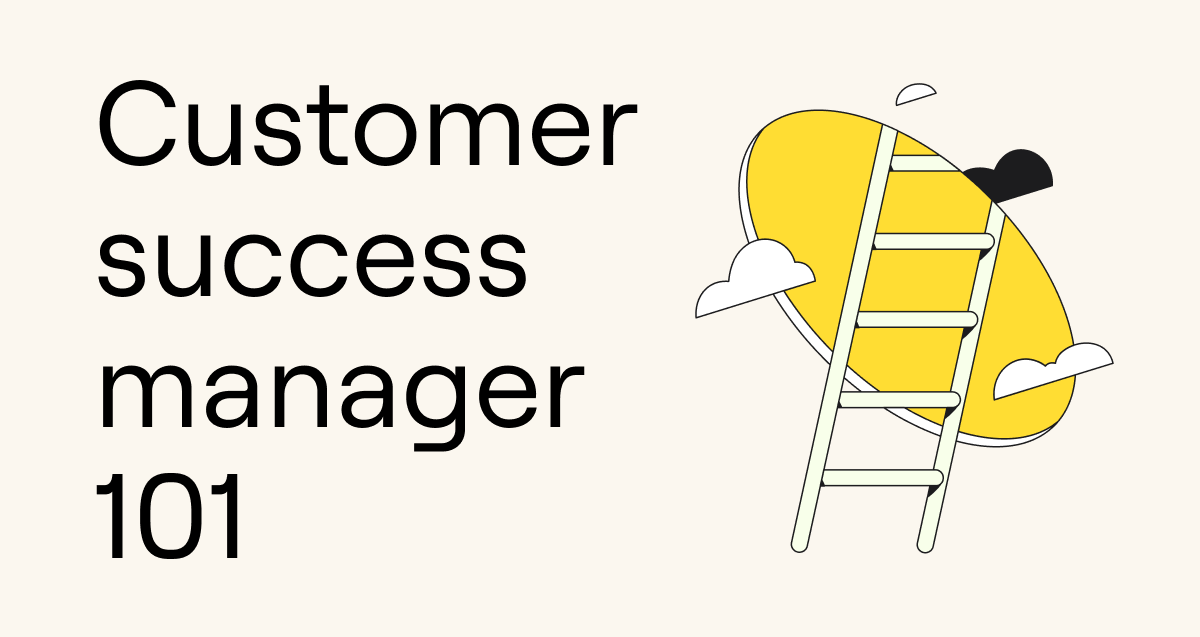It’s not quite customer service. It’s not quite sales. And it’s not quite account management. So what exactly is customer success management?
A decade ago, nobody would have been able to tell you what a customer success manager (CSM) is. Fast forward to today, and it’s a critical role in many industries. This is especially true in tech companies like Miro, where factors like complex products, subscription-based models, and high competition mean that companies simply can’t slack on keeping customers happy.
If you’ve got questions about CSMs and what they’re all about, you’re in the right place. In this article, we’ll cover all the basics of this role, what it entails, and what your pathway could look like if you’re interested in becoming one yourself.
What is a customer success manager?
In a nutshell, a customer success manager is responsible for educating customers on the product, ensuring that their voice is heard and their needs are consistently met, and keeping them around for as long as possible. This role thrives in a customer-centric business model, where the customer comes first.
The CSM bridges the gap between the customer and internal teams like sales, marketing, product, and dev teams. They work to optimize the product and the company’s operations to ensure that everything is primed for long-term customer satisfaction. Here’s what Miro’s Business Recruiter Andrea Rocha Pitta says about the core mission of the CSM:
The core mission of a customer success manager is to make customers love the product and build long-lasting partnerships. It's not only about supporting immediate needs but understanding business goals to build success plans. It's about driving value from the start, leading to good adoption and retention.
The customer success manager typically comes into the picture in the post-sale phase, right after a new customer signs on. The customer’s key contact may move from a member of the sales team to their new CSM. This immediate transition helps customers to see value in their purchase as soon as possible.
How is customer success different from customer support?
One of the key differences between customer success and customer support is proactivity. Customer support managers are more reactive, answering queries, concerns, and complaints from customers.
On the other hand, those who work in customer success have a more proactive role. They’re actively working to identify any potential queries, concerns, and complaints that customers could have, so they can prevent them from happening in the first place.
Customer success manager job description: 5 key tasks
The customer success manager role will vary slightly from company to company, but some key responsibilities generally stay the same. Here’s an insight into a few of the top responsibilities for a CSM at Miro.
1. Onboarding new customers
The CSM greets new customers and explains how to use the product, including how specific features and tools can help them accomplish their unique goals. The faster the customer knows how to use the product, the better their chances of success.
2. Driving product integration and use
It can be overwhelming and complicated (and downright hard) to fully integrate a new tool into your tech stack and daily operations. That’s why a CSM checks in regularly, answering all the customer’s questions and showing them how to use the product in the best possible ways. CSMs work to eliminate all the roadblocks that can get in the way of full integration.
3. Upselling, cross-selling, and renewals
The CSM role also includes a touch of sales. They may be responsible for renewals, as well as upselling and cross-selling customers on other product or service offerings where they see an opportunity that fits. This boosts the customer lifetime value (CLV) for the company while making sure the customer is reaping the full benefits.
4. Nurturing long-term relationships
The name of the game for the CSM is customer loyalty and retention. If the CSM can’t solve a specific issue, they’re connecting customers with the team members who can. For example, they can route technical issues to the customer support team and ensure those relationships go smoothly too. CSMs are essentially cheerleaders for both sides, with an attitude that says: “Here’s what you want to accomplish, and here’s how our product and team can help you do it.”
Laura Plank, Miro’s Customer Success Lead of the DACH region, shared her view on the core skills and strategies needed to effectively problem-solve in a customer success management role. Here’s what she said:
The first step in solving a customer problem is finding the root cause. Ask questions, listen, be empathetic. Then initiate an ideation session with stakeholders for a solution. The most important thing is to communicate openly and ensure customers are aligned and feel heard.
5. Building cross-functional feedback loops
The CSM has the customer intelligence to know what they want and need, as well as their complaints and challenges. CSMs also have a direct communication line with other teams, like sales, product, marketing, and dev. CSMs use these data streams to facilitate cross-functional collaboration so that customer insights can be incorporated into internal functions and vice versa.
Top customer success management skills
Because a CSM wears several hats, they ideally have a diverse range of both hard and soft skills. Let’s look at some of the ones you’ll likely see in a customer success manager job description.
Hard skills for CSMs
Product and industry knowledge. CSMs need to understand what they’re representing inside and out. This allows them to support customers and guide them to optimal usage of the features that are available to them.
Technical proficiency. There will be other customer success tools needed to do the CSM job, like customer relationship management (CRM) systems and analytics tools.
Data analysis. CSMs need to be able to collect, analyze, and interpret customer data and usage patterns. Then, they can use this information to identify opportunities for improvement and create actionable plans to get there.
Project management. CSMs help multiple customers build a game plan for their success, then follow through with important milestones and progress markers. It’s critical to make sure that all these targets are consistently hit.
Training and education. In addition to one-on-one onboarding with customers, CSMs might also lead training seminars and workshops for entire customer teams.
Soft skills for CSMs
Communication. The ideal CSM is a “people person” who’s well-spoken and articulate. They’re able to quickly and easily communicate complicated ideas, work through challenges, and inspire action.
Empathy. CSMs are a form of support for customers through all the ups and downs. It’s important to understand their experiences from their shoes, offering patience and compassion to get things done together. Andrea agrees that empathy reigns:
The Customer Success path requires creative thinking, adaptability and really strong relationship building skills. Empathy is the main factor for success in all of the above. But exactly does empathy mean? Actively listening, deeply understanding those around you, truly building connections and communicating clearly.
Strategic thinking. Problems are absolutely going to come up. CSMs need to be able to think on their feet, using strategic thinking and creative problem solving to put out any unexpected fires and get to the end goal.
Collaboration. Self-sufficiency is important, but so is working together. CSMs are liaisons to multiple people and teams, so it’s critical that they’re able to collaborate and get things done smoothly.
How to become a customer success manager
As with most careers, the path to management typically starts with a specialist role. This is why you’ll see that many customer success managers (including many at Miro) have experience as customer success specialists, or even customer service specialists or managers.
But what if you don’t have any experience, or only have a bit? Let’s walk through the general path to customer success manager jobs.
- Education. Many customer success manager jobs require a bachelor’s degree, but not all of them. Scout your options to see what applies to you.
- Experience. On average, you’ll likely need around 4-6 years of customer-facing experience in a role like customer support, sales, or account management. You can also get experience through internships, co-ops, and other hands-on opportunities.
- Skills. You’ll need to have all (or at least most) of the hard and soft skills we discussed in the last section. If you’re lacking some, consider training, courses, and career development, or even customer success manager certification.
- Applications and interviews. Prepare your customer success manager cover letter and resume to tailor to each job you apply for. Research potential interview questions for customer success manager jobs so you know what to expect.
- Continued education. Even after you’ve landed the gig, don’t stop learning and growing professionally. There’s no downside to being even better!
Customer success manager job outlook
Generally speaking, the job outlook is positive. Since it first came around, the customer success role has only become more popular and more important. The role is growing rapidly within SaaS and tech companies, but extending to other industries like finance, healthcare, retail, manufacturing, and many more.
The customer success field offers competitive salaries with flexible remote and hybrid positions, as well as opportunities for growth within the company. For example, a CSM can climb the ranks to senior CSM or director of customer success, or make lateral moves into areas like sales or product management.
Here’s how Laura sees the role of customer success managers evolving further, and what professionals in this field should be prepared for:
Digitalization and AI helps with automation and streamlining processes and will make customer success more scalable and efficient in the future. What will remain and become even more important is building strong relationships. Personal human connection is the base and the driver behind every strategic customer engagement.
A growing role for a changing world
Businesses are turning more and more attention to customer satisfaction, loyalty, and retention—and it’s clear that reactive customer service and putting out fires isn’t the way to make that happen in the long run. The customer success manager role brings immense value to brands, so it’s no mystery that it’s poised to continue growing quickly.
If you’re interested in becoming a customer success manager at Miro or elsewhere, you may not be too far away. Consider the skills and knowledge you have now, as well as how you can build them if needed. It may just be your next big step.
Customer success manager FAQ
1. What does a customer success manager do on a typical day?
At Miro, CSMs manage a book consisting of 20-30 customers from a variety of industries. They communicate with customers every day via email, phone, or video calls. They also do things like data analysis and reporting, meeting with internal teams, creating and executing growth plans for customers, and sales activity like upselling and cross-selling.
2. Do I need a background in sales to be a customer success manager?
Not necessarily. It’s always a bonus, but it won’t be a requirement for every CSM position. This is the case for many CSM roles at Miro. Browse through some openings you’re interested in to see if you might need to beef up your sales experience for your customer success manager resume.
3. What is the career growth potential for a customer success manager?
There’s plenty of growth in customer success management. You can rise the ranks into a position like senior CSM or director of customer success, or you can grow into another area like sales or product management.
4. Are customer success managers limited to specific industries?
No, they’re popping up everywhere! You’ll find CSMs most commonly in tech and SaaS, but also in fields like education, healthcare, hospitality, manufacturing, finance, government, automotive, and more.








